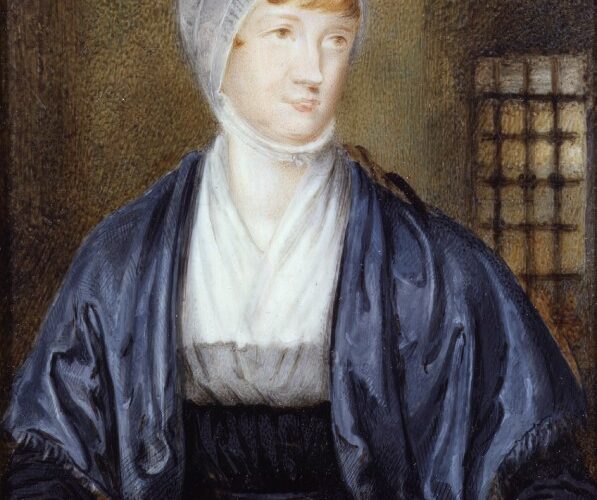Portrait of Elizabeth Fry
Theme: Challenging law and order: British riots and reforms, Challenging slavery: abolition and opposition
Elizabeth Gurney Fry (1780 – 1845) was a social reformer, best remembered for her work improving conditions for people in prison. She was the first female prison reformer in Europe, and probably the best known of her time. She became known as ‘the angel of the prisons.’
Elizabeth Fry (known as Betsy) was born in Norwich to a wealthy family. Her father was a banker and her mother was a member of the Barclay family (both branches of the family went on to merge as Barclay’s Bank in 1896). She was raised as a Quaker (a religion rooted in Christianity that broke off from the Church of England and allowed more female preaching), believing in equality, social justice and peace.
In 1813, after learning of the terrible conditions experienced by prisoners, Elizabeth Fry began visiting women in Newgate prison. At that time, it was common for poor people, desperately hungry, to resort to stealing to feed themselves and their families. And if a woman was sent to prison, her young children would go with her. Fry was shocked to see men, women and children all kept together in dirty, crowded dungeon-like rooms. They were dressed in rags and had no toilets, beds or proper food. Disease was rife and many prisoners died as a result.
From that moment, she began campaigning for better prison conditions. She visited Newgate regularly, bringing warm, clean clothes for babies and children and blankets for the sick. She taught the women useful skills that might help them find work once they were released, like reading, writing and sewing. She also read to them from the Bible.
As well as her own work with prisoners, she campaigned for better conditions. Her campaigns included working to lessen overcrowding, separate areas for men and women, female guards for women prisoners, and less solitary confinement – which she thought especially bad for mental health. Fry also believed more visits from friends and family should be allowed, and that prisoners should be given useful things to do. In 1821 she founded the British Ladies’ Society for Promoting the Reformation of Female Prisoners, the first national organisation for women.
Elizabeth Fry helped those outside prison too. She set up a primary school when she was 17, helped sick neighbours, set up a night shelter for the homeless in London, helped campaign to end the Transatlantic slave trade, and began a training school for nurses. Queen Victoria was one of the many people who admired and supported her in her work.
Did you know..?
Elizabeth Fry appeared on the £5 note. She is one of only three women (aside from the Queen) to appear on a Bank of England banknote.
Use our Classroom resources to investigate this object and the theme of Social Reform further.
Highlights:
- Using objects, artworks and other sources to find out about the past
- Age of Revolution Top Trumps
- Twitter campaigns
And much more…
Sources & acknowledgements
This object description and its related educational resources were researched and written by our team of historians and education specialists. For further information see the item’s home museum, gallery or archive, listed above.
- Related resources
-
Did you know..?
Elizabeth Fry appeared on the £5 note. She is one of only three women (aside from the Queen) to appear on a Bank of England banknote.
-
Education overview
You can access a range of teachers resources related to this object and more on our education page.
Please also see our glossary of terms for more detailed explanations of the terms used.
-
Curatorial info
- Originating Museum: National Portrait Gallery
- Accession Number: NPG 118
- Production Date: c.1815
- Creator: Samuel Drummond
- Size: 4 1/2 in. x 3 1/4 in. (114 mm x 83 mm)
- Original record
-
Use this image
You can download this image for personal and educational use but please take note of the license type and rights holder information.
- Rights Holder: National Portrait Gallery
- License Type:



